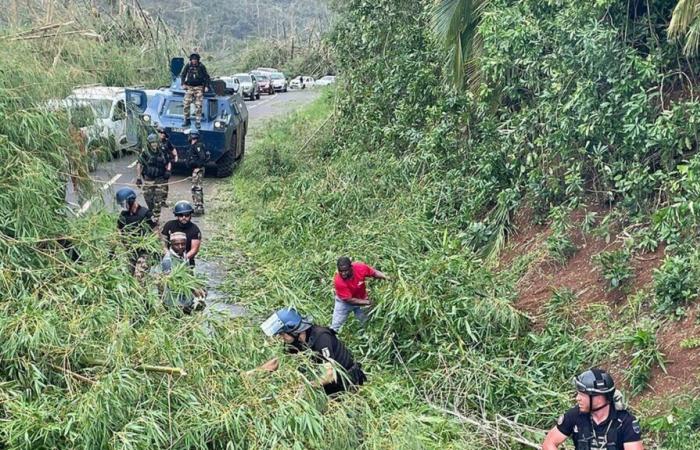
An immense challenge, in a department where everything has to be rebuilt. After the devastating passage of Cyclone Chido on Mayotte on Saturday, the authorities are having great difficulty counting the number of dead and injured it left behind. In the latest provisional report published Tuesday, December 17 at midday, the Ministry of the Interior reported 22 people dead in hospital, specifying that this report remained “very difficult to consolidate”. The same day, before the deputies, the Prime Minister, François Bayrou, was hardly more precise, evoking “around twenty dead, 200 seriously injured”, “1,500 injured in relative emergency” and a balance sheet “not yet established”.
From the first hours following the disaster, the authorities warned. “There will certainly be several hundred [de morts]perhaps we will approach a thousand, or even a few thousand”explained the prefect of the department, François-Xavier Bieuville, on Sunday in Mayotte la 1ère. Faced with the scale of the task, the authorities ordered “the establishment of a mission to search for the dead” among the communities living in this department, the poorest in France. Why do the authorities encounter so many difficulties in establishing an accurate assessment? Franceinfo takes stock.
Considerable material damage slows down rescue efforts
The destruction makes emergency work difficult and therefore access to victims. The cyclone devastated the archipelago, where a large number of homes are fragile, even very precarious. According to the latest data produced by INSEE, which dates from 2017, four out of ten homes in Mayotte are made of sheet metal, earth or wood. Most often, specifies the statistics institute, these precarious dwellings are occupied by foreigners: 65% of them live in a sheet metal house, compared to 25% of French natives of the archipelago. “It’s wood, sheet metal on clay hills. You imagine the wind rushing in, plus the rain creating mudslides”tells AFP the director of emergencies and operations of the French Red Cross, Florent Vallée. Rudimentary materials which, for the most part, did not withstand the gusts of more than 230 km/h recorded on the archipelago. Even solid houses saw their roofs taken away and their windows blown out, according to residents’ testimonies.
Infrastructure was also heavily damaged. The control tower at Pamandzi airport suffered significant damage and maritime connections were cut. LMamoudzou hospital was not spared. During the passage of the cyclone, on images filmed inside the establishment, we can see the submerged ground and the caregivers trying to clean up, with their feet in the water. LThe medical centers were also “inoperative”Monday, according to the resigning Minister of Health, Geneviève Darrieussecq.
The damage is also very significant on the main roads, even if “around 80% of the road network is accessible again”assured François Bayrou before the deputies on Tuesday. “We are still in a complete reconnaissance phase of clearing access routes to go to the most isolated places and understand the impact and consequences of this cyclone”explains on France Bleu Jérôme Giron, president of the NGO French Humanitarian Firefighters (PHF). As of Tuesday, power was still being restored with the “restart” of “50% of the electricity network”tried to reassure the Prime Minister. Non-potable water is once again accessible and 50% of drinking water “will be restored within 48 hours and 95% within seven days”specified the daily government update. In total, 95% of the mobile telephone network remained unavailable on Tuesday, according to Mayotte La 1ère.
The actual population is difficult to estimate and sometimes to reach
On Tuesday, the Ministry of the Interior announced that 70% of the inhabitants of Mayotte had been “seriously affected” by Cyclone Chido, without being able to specify to what extent. The balance sheet “real” of the cyclone will not be “Never” known to the authorities, deplores Estelle Youssouffa, Liot deputy for the first constituency of Mayotte, “since it is a population in an irregular, clandestine situation”which is not declared to local authorities. Mayotte officially has 321,000 inhabitants, according to the latest estimate from INSEE. In its update on the situation, the Ministry of the Interior estimates the number of people living in precarious housing at 100,000.
The count is all the more complicated because Mayotte is a land with a strong Muslim tradition and, according to Islamic rites, many of the deceased were probably buried within 24 hours of their death. It is therefore possible that victims have already been buried without having been declared to the authorities. “There are more burials than deaths reported. It will not be easy to have the exact data”recognizes Yannick Le Bihan, of the NGO Médecins du monde.
Finally, the number of isolated children victims of the cyclone could also increase in the days to come. “There is a chronic phenomenon of orphans: when undocumented parents are deported to the Comoros, they do not necessarily say that they have children… and sometimes drown trying to returnexplained to AFP Jean-François Corty, president of Médecins du monde. We don’t really know where these children are today.”
Relief services were also affected by the cyclone
Civil servants, members of rescue teams, caregivers… The personnel on the front line to help the population are directly affected by the disaster. “We only managed to make contact with five members of our paid team and five active volunteers, due to communication problems and power cutsnotes to franceinfo Yannick Le Bihan, at the head of a team of Médecins du monde present on site which includes 25 very active volunteers and 80 in total. Our office was affected and we can no longer use our equipment. Some members of our teams no longer have a roof or no windows in their homes, and problems accessing drinking water and food.”
Same observation for the Red Cross, which was still unable, on Tuesday, to get in touch with 200 of its volunteers present on the archipelago. For its part, the Apprentis d’Auteuil foundation in Mayotte “managed to reach around 70 people across the [son] staff. Only 70 out of 220 to date”, confided to franceinfo Gwenola Coulange, the director of the organization.
For these organizations, “the priority, for the moment, is not to give a figure. It is to save the people we can still save and to avoid a health crisis”explains to Liberation Eric Brocardi, spokesperson for the National Federation of Firefighters.





